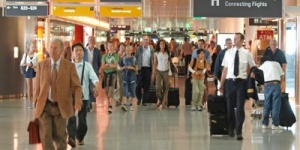Munich Airport - highest average load factor since the airport opened in 1992

Despite the generally challenging economic conditions, Munich Airport yet again posted all-time records for sales and passengers in the 2012 operating year: Preliminary figures reported by FMG, the airport’s operating company, indicate total revenues of just under €1.2 billion for the group over the past year – a gain of more than €50 million, or 5%, as compared with 2011. The operating result (EBITDA), at approximately €515 million, is €30 million (6%) higher than the previous year’s result. Earnings after tax (EAT) are expected to increase to about €95 million.
The total passenger volume of 38.4 million in 2012 marked yet another all-time high, and exceeded the previous year’s figure by 600,000, or nearly 2%. As a result, the growth rate at Munich Airport was well above the industry average in Germany. In scheduled and charter traffic, a total of 400,000 take-offs and landings took place in 2012: a decrease of 2.9 percent from the previous year. “The airlines absorbed the increased passenger demand in 2012 by upgrading their fleets with larger aircraft,” explained Dr. Michael Kerkloh, the President and CEO of FMG, speaking at FMG’s annual press conference at Munich Airport today.
The increasing operational effectiveness at Bavaria’s international hub is underscored by the trend in aircraft load factors: Last year, Munich Airport achieved the highest level in this category since it opened in 1992, namely 74.5%. By comparison: In the airport’s first year of operations, the average seat occupancy of aircraft was just 60.7%. In 2012, the average number of seats per flight in Munich increased by four to 138, as compared with just 111 seats in 2002 – only 10 years ago. Moreover, arriving and departing flights carried an average of 103 passengers last year. This marked the first time that this figure reached triple digits.
The airport handled approximately 272,000 tons of airfreight in 2012. Combined with airmail, the volume of flown airfreight topped 290,000 tons. This marked a decline of 4% as compared with 2011, attributable above all to the economic situation in parts of the eurozone and other important airfreight markets.
More than 100 airlines offered scheduled services from Munich in 2012 to 242 destinations in 68 countries. The increase in passenger figures in Munich in 2012 mainly resulted from above-average gains in the European traffic segment: Services between Munich and continental destinations were used by nearly 23 million passengers. This represents a year-on-year gain of over 3 percent. With some 5.7 million passengers, the intercontinental segment showed a 1 percent increase last year. By contrast, traffic within Germany was down by nearly 2 percent to 9.6 million passengers.
ADVERTISEMENT
The slight decreases in the number of take-offs and landings at Munich Airport were seen almost exclusively in non-peak times of day. As a result, the capacity crunch at peak periods remained. Consequently, Kerkloh sees a real danger that, unless the third runway is built, airlines and passengers will find their way to other airports. Kerkloh: “At the same time, this will mean the loss of important economic and employment effects for the state of Bavaria. The competitive advantages of having a major airport on the doorstep – both for the regional economy and for investors and companies planning to set up operations – are enormous. But they are crucially dependent on the range of flights offered.”
Meanwhile, the implementation of the second strategic expansion project at Munich Airport is already well underway. The new satellite terminal is taking shape on the airport’s eastern apron. The next milestone for this new passenger facility will be the topping-out ceremony, scheduled for September.
Against the backdrop of the current turbulence in the German aviation industry, airport CEO Kerkloh – also speaking in his capacity as the new president of the German Airports Association – emphasized the importance of the industry for the economy as a whole: “The German aviation industry employs more than 800,000 people, provides our domestic companies with efficient links to a global route network, and plays a key role in our economy by providing impetus to many other economic sectors. Consequently, those who help to boost the competitiveness of German aviation will, at the same time, make a contribution to prosperity and employment in our country that extends far beyond the industry itself.“

